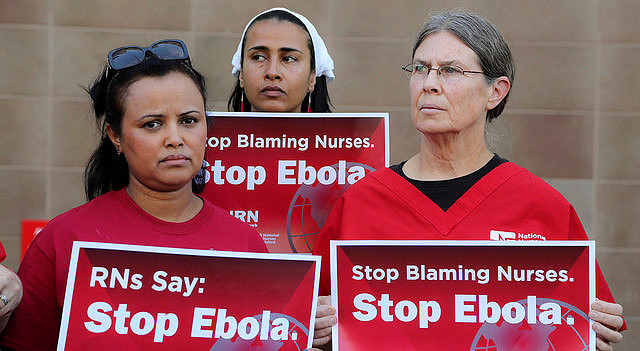News
How to Advocate on Ebola: National Nurses United

As American health care workers now confront the risk of Ebola here in the U.S., National Nurses United has taken center stage. They’ve been fighting to get better protection for nurses who treat Ebola patients — and doing a lot of things right.
Many associations can learn a thing or two about advocacy from watching the nurses in action.
The group, a union and professional association of registered nurses with almost 185,000 members, has been quoted in The New York Times, The Washington Post, The Boston Globe, The Dallas Morning-News and almost any other publication you care to read. They have practically been a fixture on CNN.
Of course, they do have a mighty cause. Few would argue that American nurses should get anything but the best protection and training when they treat Ebola patients — especially when the first two people to contract the disease on U.S. soil were nurses.
But National Nurses United has also engaged in some very smart advocacy. For example:
- They Jumped in Fast. The group jumped into the fray quickly as the issue over how to handle Ebola in the U.S. was heating up. At a time when the media was looking for genuine voices to augment those of government officials, theirs was loud and clear.
- They Brought a Clear Message. Their message that nurses treating Ebola should have the very best protective suits and training — and that many hospitals don’t provide that — is common sense and easy to grasp. It also pushed back against attempts to blame nurses for the spread of the disease, without getting defensive.
- They Made Real News. They went to work in Dallas, where the two nurses were diagnosed, and tried to gather information about the hospital where it happened. Eventually, the nurses at Texas Health Presbyterian Hospital released a statement anonymously through National Nurses United, describing conditions at the hospital. It advanced the story and news outlets had to cover it.
- They Brought Data. Tapping their large membership, they were able to poll roughly 2,200 nurses at 750 facilities in 46 states. Eight-five percent said their hospitals were not providing training in which nurses could ask questions. These are numbers that reporters could use. They also le
- They Stayed Active. They kept up the pressure, holding a nationwide conference call on Wednesday. More than 11,500 nurses got on the line. They also wrote a letter directly to President Obama asking him to mandate change.
- They Pushed Back. When government officials claimed the first nurse who contracted Ebola breached protocol, National Nurses United launched a campaign with slogans like “Don’t Blame Nurses, Protect Them.” Government officials backed down.
While National Nurses United is clearly a large and savvy organization, their advocacy also has an organic feel. The people they put before the cameras do not look like slick mouthpiece types. They look like nurses, people who spend their days in scrubs with the pockets stuffed full of meds and scopes, and comfortable shoes because they walk a few miles on every shift.
Of course, not everything the group has done was perfect, and its still unclear whether they will achieve their objective. There are also other groups that have been outspoken, such as the American Nurses Association. But in a town with dozens of associations dedicated to health care, National Nurses United stands out.